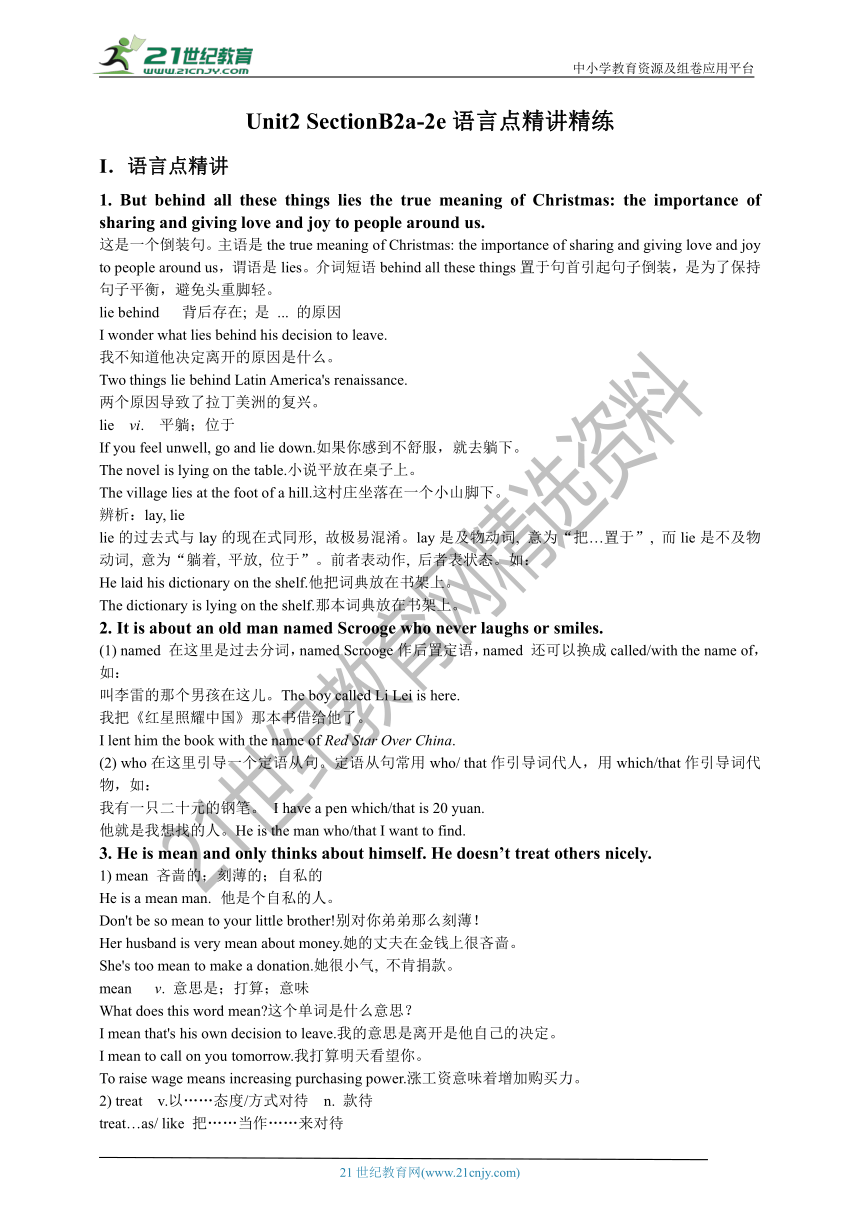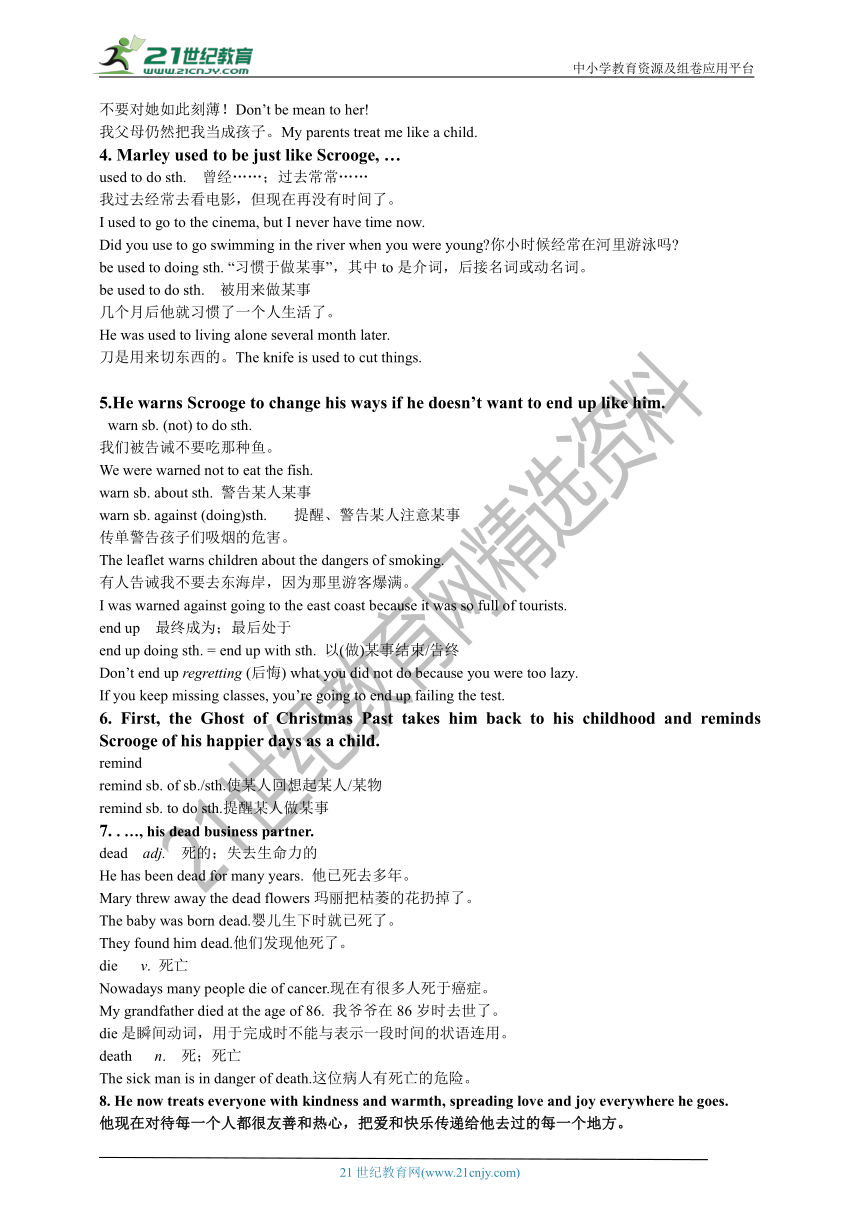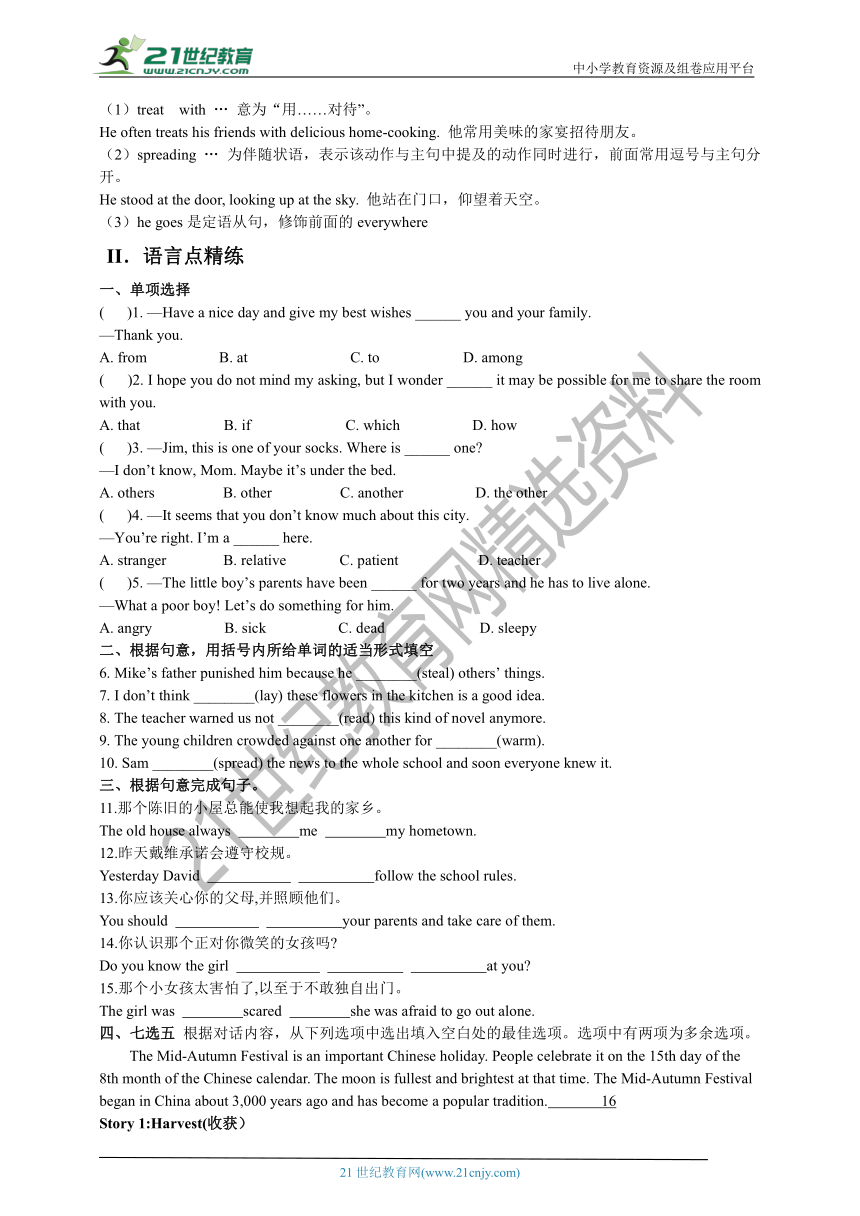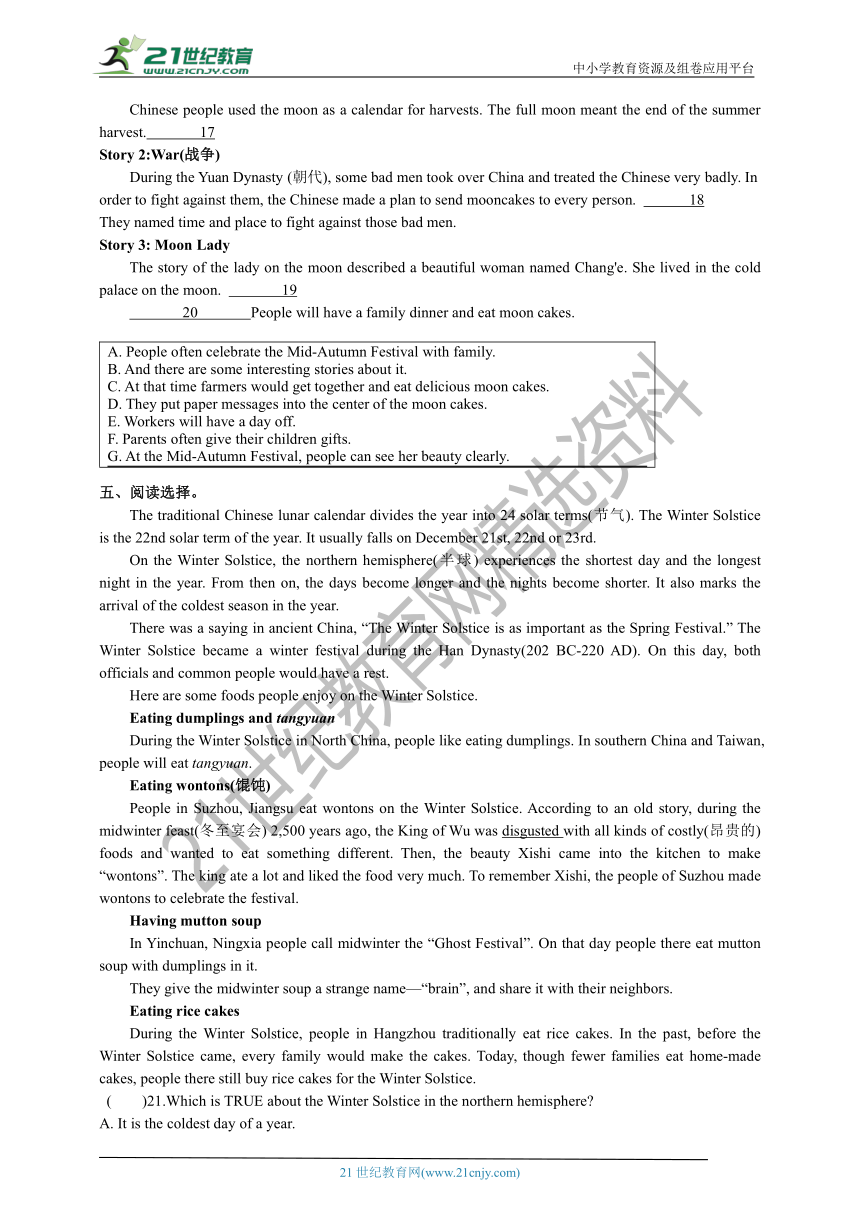(新课标) Unit 2 I think that mooncakes are delicious!Section B 2a-2e 语言点精讲精练(含答案)
文档属性
| 名称 | (新课标) Unit 2 I think that mooncakes are delicious!Section B 2a-2e 语言点精讲精练(含答案) |

|
|
| 格式 | zip | ||
| 文件大小 | 1.3MB | ||
| 资源类型 | 试卷 | ||
| 版本资源 | 人教新目标(Go for it)版 | ||
| 科目 | 英语 | ||
| 更新时间 | 2022-09-14 00:00:00 | ||
图片预览




文档简介
中小学教育资源及组卷应用平台
Unit2 SectionB2a-2e语言点精讲精练
I.语言点精讲
1. But behind all these things lies the true meaning of Christmas: the importance of sharing and giving love and joy to people around us.
这是一个倒装句。主语是the true meaning of Christmas: the importance of sharing and giving love and joy to people around us,谓语是lies。介词短语behind all these things置于句首引起句子倒装,是为了保持句子平衡,避免头重脚轻。
lie behind 背后存在; 是 ... 的原因
I wonder what lies behind his decision to leave.
我不知道他决定离开的原因是什么。
Two things lie behind Latin America's renaissance.
两个原因导致了拉丁美洲的复兴。
lie vi. 平躺;位于
If you feel unwell, go and lie down.如果你感到不舒服,就去躺下。
The novel is lying on the table.小说平放在桌子上。
The village lies at the foot of a hill.这村庄坐落在一个小山脚下。
辨析:lay, lie
lie的过去式与lay的现在式同形, 故极易混淆。lay是及物动词, 意为“把…置于”, 而lie是不及物动词, 意为“躺着, 平放, 位于”。前者表动作, 后者表状态。如:
He laid his dictionary on the shelf.他把词典放在书架上。
The dictionary is lying on the shelf.那本词典放在书架上。
2. It is about an old man named Scrooge who never laughs or smiles.
(1) named 在这里是过去分词,named Scrooge作后置定语,named 还可以换成called/with the name of,如:
叫李雷的那个男孩在这儿。The boy called Li Lei is here.
我把《红星照耀中国》那本书借给他了。
I lent him the book with the name of Red Star Over China.
(2) who在这里引导一个定语从句。定语从句常用who/ that作引导词代人,用which/that作引导词代物,如:
我有一只二十元的钢笔。 I have a pen which/that is 20 yuan.
他就是我想找的人。He is the man who/that I want to find.
3. He is mean and only thinks about himself. He doesn’t treat others nicely.
1) mean 吝啬的;刻薄的;自私的
He is a mean man. 他是个自私的人。
Don't be so mean to your little brother!别对你弟弟那么刻薄!
Her husband is very mean about money.她的丈夫在金钱上很吝啬。
She's too mean to make a donation.她很小气, 不肯捐款。
mean v. 意思是;打算;意味
What does this word mean 这个单词是什么意思?
I mean that's his own decision to leave.我的意思是离开是他自己的决定。
I mean to call on you tomorrow.我打算明天看望你。
To raise wage means increasing purchasing power.涨工资意味着增加购买力。
2) treat v.以……态度/方式对待 n. 款待
treat…as/ like 把……当作……来对待
不要对她如此刻薄!Don’t be mean to her!
我父母仍然把我当成孩子。My parents treat me like a child.
4. Marley used to be just like Scrooge, …
used to do sth. 曾经……;过去常常……
我过去经常去看电影,但现在再没有时间了。
I used to go to the cinema, but I never have time now.
Did you use to go swimming in the river when you were young 你小时候经常在河里游泳吗
be used to doing sth. “习惯于做某事”,其中to是介词,后接名词或动名词。
be used to do sth. 被用来做某事
几个月后他就习惯了一个人生活了。
He was used to living alone several month later.
刀是用来切东西的。The knife is used to cut things.
5.He warns Scrooge to change his ways if he doesn’t want to end up like him.
warn sb. (not) to do sth.
我们被告诫不要吃那种鱼。
We were warned not to eat the fish.
warn sb. about sth. 警告某人某事
warn sb. against (doing)sth. 提醒、警告某人注意某事
传单警告孩子们吸烟的危害。
The leaflet warns children about the dangers of smoking.
有人告诫我不要去东海岸,因为那里游客爆满。
I was warned against going to the east coast because it was so full of tourists.
end up 最终成为;最后处于
end up doing sth. = end up with sth. 以(做)某事结束/告终
Don’t end up regretting (后悔) what you did not do because you were too lazy.
If you keep missing classes, you’re going to end up failing the test.
6. First, the Ghost of Christmas Past takes him back to his childhood and reminds Scrooge of his happier days as a child.
remind
remind sb. of sb./sth.使某人回想起某人/某物
remind sb. to do sth.提醒某人做某事
7. . …, his dead business partner.
dead adj. 死的;失去生命力的
He has been dead for many years. 他已死去多年。
Mary threw away the dead flowers玛丽把枯萎的花扔掉了。
The baby was born dead.婴儿生下时就已死了。
They found him dead.他们发现他死了。
die v. 死亡
Nowadays many people die of cancer.现在有很多人死于癌症。
My grandfather died at the age of 86. 我爷爷在86岁时去世了。
die是瞬间动词,用于完成时不能与表示一段时间的状语连用。
death n. 死;死亡
The sick man is in danger of death.这位病人有死亡的危险。
8. He now treats everyone with kindness and warmth, spreading love and joy everywhere he goes.
他现在对待每一个人都很友善和热心,把爱和快乐传递给他去过的每一个地方。
(1)treat with … 意为“用……对待”。
He often treats his friends with delicious home-cooking. 他常用美味的家宴招待朋友。
(2)spreading … 为伴随状语,表示该动作与主句中提及的动作同时进行,前面常用逗号与主句分开。
He stood at the door, looking up at the sky. 他站在门口,仰望着天空。
(3)he goes是定语从句,修饰前面的everywhere
II.语言点精练
一、单项选择
( )1. —Have a nice day and give my best wishes ______ you and your family.
—Thank you.
A. from B. at C. to D. among
( )2. I hope you do not mind my asking, but I wonder ______ it may be possible for me to share the room with you.
A. that B. if C. which D. how
( )3. —Jim, this is one of your socks. Where is ______ one
—I don’t know, Mom. Maybe it’s under the bed.
A. others B. other C. another D. the other
( )4. —It seems that you don’t know much about this city.
—You’re right. I’m a ______ here.
A. stranger B. relative C. patient D. teacher
( )5. —The little boy’s parents have been ______ for two years and he has to live alone.
—What a poor boy! Let’s do something for him.
A. angry B. sick C. dead D. sleepy
二、根据句意,用括号内所给单词的适当形式填空
6. Mike’s father punished him because he ________(steal) others’ things.
7. I don’t think ________(lay) these flowers in the kitchen is a good idea.
8. The teacher warned us not ________(read) this kind of novel anymore.
9. The young children crowded against one another for ________(warm).
10. Sam ________(spread) the news to the whole school and soon everyone knew it.
三、根据句意完成句子。
11.那个陈旧的小屋总能使我想起我的家乡。
The old house always me my hometown.
12.昨天戴维承诺会遵守校规。
Yesterday David follow the school rules.
13.你应该关心你的父母,并照顾他们。
You should your parents and take care of them.
14.你认识那个正对你微笑的女孩吗
Do you know the girl at you
15.那个小女孩太害怕了,以至于不敢独自出门。
The girl was scared she was afraid to go out alone.
四、七选五 根据对话内容,从下列选项中选出填入空白处的最佳选项。选项中有两项为多余选项。
The Mid-Autumn Festival is an important Chinese holiday. People celebrate it on the 15th day of the 8th month of the Chinese calendar. The moon is fullest and brightest at that time. The Mid-Autumn Festival began in China about 3,000 years ago and has become a popular tradition. 16
Story 1:Harvest(收获)
Chinese people used the moon as a calendar for harvests. The full moon meant the end of the summer harvest. 17
Story 2:War(战争)
During the Yuan Dynasty (朝代), some bad men took over China and treated the Chinese very badly. In order to fight against them, the Chinese made a plan to send mooncakes to every person. 18 They named time and place to fight against those bad men.
Story 3: Moon Lady
The story of the lady on the moon described a beautiful woman named Chang'e. She lived in the cold palace on the moon. 19
20 People will have a family dinner and eat moon cakes.
A. People often celebrate the Mid-Autumn Festival with family.B. And there are some interesting stories about it.C. At that time farmers would get together and eat delicious moon cakes.D. They put paper messages into the center of the moon cakes.E. Workers will have a day off.F. Parents often give their children gifts.G. At the Mid-Autumn Festival, people can see her beauty clearly.
五、阅读选择。
The traditional Chinese lunar calendar divides the year into 24 solar terms(节气). The Winter Solstice is the 22nd solar term of the year. It usually falls on December 21st, 22nd or 23rd.
On the Winter Solstice, the northern hemisphere(半球) experiences the shortest day and the longest night in the year. From then on, the days become longer and the nights become shorter. It also marks the arrival of the coldest season in the year.
There was a saying in ancient China, “The Winter Solstice is as important as the Spring Festival.” The Winter Solstice became a winter festival during the Han Dynasty(202 BC-220 AD). On this day, both officials and common people would have a rest.
Here are some foods people enjoy on the Winter Solstice.
Eating dumplings and tangyuan
During the Winter Solstice in North China, people like eating dumplings. In southern China and Taiwan, people will eat tangyuan.
Eating wontons(馄饨)
People in Suzhou, Jiangsu eat wontons on the Winter Solstice. According to an old story, during the midwinter feast(冬至宴会) 2,500 years ago, the King of Wu was disgusted with all kinds of costly(昂贵的) foods and wanted to eat something different. Then, the beauty Xishi came into the kitchen to make “wontons”. The king ate a lot and liked the food very much. To remember Xishi, the people of Suzhou made wontons to celebrate the festival.
Having mutton soup
In Yinchuan, Ningxia people call midwinter the “Ghost Festival”. On that day people there eat mutton soup with dumplings in it.
They give the midwinter soup a strange name—“brain”, and share it with their neighbors.
Eating rice cakes
During the Winter Solstice, people in Hangzhou traditionally eat rice cakes. In the past, before the Winter Solstice came, every family would make the cakes. Today, though fewer families eat home-made cakes, people there still buy rice cakes for the Winter Solstice.
( )21.Which is TRUE about the Winter Solstice in the northern hemisphere
A. It is the coldest day of a year.
B. It is the shortest day of a year.
C. It is always on December 22nd every year.
D. The day is longer than the night.
( )22.In China the Winter Solstice became a winter festival about years ago.
A.2,700 B.2,600 C.2,000 D.1,500
( )23.Which of the following can best replace the underlined word “disgusted”
A. Interested. B. Hungry. C. Famous. D. Bored.
( )24.The traditional food on the Winter Solstice in Suzhou, Jiangsu is .
A. dumplings B. wontons C. mutton soup D. rice cakes
( )25.What is the best title for the passage
A. The Celebration of the Winter Solstice
B. The History of the Winter Solstice
C. The Winter Solstice in China
D. Traditional Foods on the Winter Solstice
II. 语言点精练参考答案
一、1-5CBDAC
二、6. stole 7. laying 8. to read 9. warmth 10. spread
三、11.reminds; of 12.promised to 13.care about 14.who/that is smiling 15.so; that
四、16-20BCDGA
五、21-25BCDBC
21世纪教育网 www.21cnjy.com 精品试卷·第 2 页 (共 2 页)
HYPERLINK "http://www.21cnjy.com/" 21世纪教育网(www.21cnjy.com)
Unit2 SectionB2a-2e语言点精讲精练
I.语言点精讲
1. But behind all these things lies the true meaning of Christmas: the importance of sharing and giving love and joy to people around us.
这是一个倒装句。主语是the true meaning of Christmas: the importance of sharing and giving love and joy to people around us,谓语是lies。介词短语behind all these things置于句首引起句子倒装,是为了保持句子平衡,避免头重脚轻。
lie behind 背后存在; 是 ... 的原因
I wonder what lies behind his decision to leave.
我不知道他决定离开的原因是什么。
Two things lie behind Latin America's renaissance.
两个原因导致了拉丁美洲的复兴。
lie vi. 平躺;位于
If you feel unwell, go and lie down.如果你感到不舒服,就去躺下。
The novel is lying on the table.小说平放在桌子上。
The village lies at the foot of a hill.这村庄坐落在一个小山脚下。
辨析:lay, lie
lie的过去式与lay的现在式同形, 故极易混淆。lay是及物动词, 意为“把…置于”, 而lie是不及物动词, 意为“躺着, 平放, 位于”。前者表动作, 后者表状态。如:
He laid his dictionary on the shelf.他把词典放在书架上。
The dictionary is lying on the shelf.那本词典放在书架上。
2. It is about an old man named Scrooge who never laughs or smiles.
(1) named 在这里是过去分词,named Scrooge作后置定语,named 还可以换成called/with the name of,如:
叫李雷的那个男孩在这儿。The boy called Li Lei is here.
我把《红星照耀中国》那本书借给他了。
I lent him the book with the name of Red Star Over China.
(2) who在这里引导一个定语从句。定语从句常用who/ that作引导词代人,用which/that作引导词代物,如:
我有一只二十元的钢笔。 I have a pen which/that is 20 yuan.
他就是我想找的人。He is the man who/that I want to find.
3. He is mean and only thinks about himself. He doesn’t treat others nicely.
1) mean 吝啬的;刻薄的;自私的
He is a mean man. 他是个自私的人。
Don't be so mean to your little brother!别对你弟弟那么刻薄!
Her husband is very mean about money.她的丈夫在金钱上很吝啬。
She's too mean to make a donation.她很小气, 不肯捐款。
mean v. 意思是;打算;意味
What does this word mean 这个单词是什么意思?
I mean that's his own decision to leave.我的意思是离开是他自己的决定。
I mean to call on you tomorrow.我打算明天看望你。
To raise wage means increasing purchasing power.涨工资意味着增加购买力。
2) treat v.以……态度/方式对待 n. 款待
treat…as/ like 把……当作……来对待
不要对她如此刻薄!Don’t be mean to her!
我父母仍然把我当成孩子。My parents treat me like a child.
4. Marley used to be just like Scrooge, …
used to do sth. 曾经……;过去常常……
我过去经常去看电影,但现在再没有时间了。
I used to go to the cinema, but I never have time now.
Did you use to go swimming in the river when you were young 你小时候经常在河里游泳吗
be used to doing sth. “习惯于做某事”,其中to是介词,后接名词或动名词。
be used to do sth. 被用来做某事
几个月后他就习惯了一个人生活了。
He was used to living alone several month later.
刀是用来切东西的。The knife is used to cut things.
5.He warns Scrooge to change his ways if he doesn’t want to end up like him.
warn sb. (not) to do sth.
我们被告诫不要吃那种鱼。
We were warned not to eat the fish.
warn sb. about sth. 警告某人某事
warn sb. against (doing)sth. 提醒、警告某人注意某事
传单警告孩子们吸烟的危害。
The leaflet warns children about the dangers of smoking.
有人告诫我不要去东海岸,因为那里游客爆满。
I was warned against going to the east coast because it was so full of tourists.
end up 最终成为;最后处于
end up doing sth. = end up with sth. 以(做)某事结束/告终
Don’t end up regretting (后悔) what you did not do because you were too lazy.
If you keep missing classes, you’re going to end up failing the test.
6. First, the Ghost of Christmas Past takes him back to his childhood and reminds Scrooge of his happier days as a child.
remind
remind sb. of sb./sth.使某人回想起某人/某物
remind sb. to do sth.提醒某人做某事
7. . …, his dead business partner.
dead adj. 死的;失去生命力的
He has been dead for many years. 他已死去多年。
Mary threw away the dead flowers玛丽把枯萎的花扔掉了。
The baby was born dead.婴儿生下时就已死了。
They found him dead.他们发现他死了。
die v. 死亡
Nowadays many people die of cancer.现在有很多人死于癌症。
My grandfather died at the age of 86. 我爷爷在86岁时去世了。
die是瞬间动词,用于完成时不能与表示一段时间的状语连用。
death n. 死;死亡
The sick man is in danger of death.这位病人有死亡的危险。
8. He now treats everyone with kindness and warmth, spreading love and joy everywhere he goes.
他现在对待每一个人都很友善和热心,把爱和快乐传递给他去过的每一个地方。
(1)treat with … 意为“用……对待”。
He often treats his friends with delicious home-cooking. 他常用美味的家宴招待朋友。
(2)spreading … 为伴随状语,表示该动作与主句中提及的动作同时进行,前面常用逗号与主句分开。
He stood at the door, looking up at the sky. 他站在门口,仰望着天空。
(3)he goes是定语从句,修饰前面的everywhere
II.语言点精练
一、单项选择
( )1. —Have a nice day and give my best wishes ______ you and your family.
—Thank you.
A. from B. at C. to D. among
( )2. I hope you do not mind my asking, but I wonder ______ it may be possible for me to share the room with you.
A. that B. if C. which D. how
( )3. —Jim, this is one of your socks. Where is ______ one
—I don’t know, Mom. Maybe it’s under the bed.
A. others B. other C. another D. the other
( )4. —It seems that you don’t know much about this city.
—You’re right. I’m a ______ here.
A. stranger B. relative C. patient D. teacher
( )5. —The little boy’s parents have been ______ for two years and he has to live alone.
—What a poor boy! Let’s do something for him.
A. angry B. sick C. dead D. sleepy
二、根据句意,用括号内所给单词的适当形式填空
6. Mike’s father punished him because he ________(steal) others’ things.
7. I don’t think ________(lay) these flowers in the kitchen is a good idea.
8. The teacher warned us not ________(read) this kind of novel anymore.
9. The young children crowded against one another for ________(warm).
10. Sam ________(spread) the news to the whole school and soon everyone knew it.
三、根据句意完成句子。
11.那个陈旧的小屋总能使我想起我的家乡。
The old house always me my hometown.
12.昨天戴维承诺会遵守校规。
Yesterday David follow the school rules.
13.你应该关心你的父母,并照顾他们。
You should your parents and take care of them.
14.你认识那个正对你微笑的女孩吗
Do you know the girl at you
15.那个小女孩太害怕了,以至于不敢独自出门。
The girl was scared she was afraid to go out alone.
四、七选五 根据对话内容,从下列选项中选出填入空白处的最佳选项。选项中有两项为多余选项。
The Mid-Autumn Festival is an important Chinese holiday. People celebrate it on the 15th day of the 8th month of the Chinese calendar. The moon is fullest and brightest at that time. The Mid-Autumn Festival began in China about 3,000 years ago and has become a popular tradition. 16
Story 1:Harvest(收获)
Chinese people used the moon as a calendar for harvests. The full moon meant the end of the summer harvest. 17
Story 2:War(战争)
During the Yuan Dynasty (朝代), some bad men took over China and treated the Chinese very badly. In order to fight against them, the Chinese made a plan to send mooncakes to every person. 18 They named time and place to fight against those bad men.
Story 3: Moon Lady
The story of the lady on the moon described a beautiful woman named Chang'e. She lived in the cold palace on the moon. 19
20 People will have a family dinner and eat moon cakes.
A. People often celebrate the Mid-Autumn Festival with family.B. And there are some interesting stories about it.C. At that time farmers would get together and eat delicious moon cakes.D. They put paper messages into the center of the moon cakes.E. Workers will have a day off.F. Parents often give their children gifts.G. At the Mid-Autumn Festival, people can see her beauty clearly.
五、阅读选择。
The traditional Chinese lunar calendar divides the year into 24 solar terms(节气). The Winter Solstice is the 22nd solar term of the year. It usually falls on December 21st, 22nd or 23rd.
On the Winter Solstice, the northern hemisphere(半球) experiences the shortest day and the longest night in the year. From then on, the days become longer and the nights become shorter. It also marks the arrival of the coldest season in the year.
There was a saying in ancient China, “The Winter Solstice is as important as the Spring Festival.” The Winter Solstice became a winter festival during the Han Dynasty(202 BC-220 AD). On this day, both officials and common people would have a rest.
Here are some foods people enjoy on the Winter Solstice.
Eating dumplings and tangyuan
During the Winter Solstice in North China, people like eating dumplings. In southern China and Taiwan, people will eat tangyuan.
Eating wontons(馄饨)
People in Suzhou, Jiangsu eat wontons on the Winter Solstice. According to an old story, during the midwinter feast(冬至宴会) 2,500 years ago, the King of Wu was disgusted with all kinds of costly(昂贵的) foods and wanted to eat something different. Then, the beauty Xishi came into the kitchen to make “wontons”. The king ate a lot and liked the food very much. To remember Xishi, the people of Suzhou made wontons to celebrate the festival.
Having mutton soup
In Yinchuan, Ningxia people call midwinter the “Ghost Festival”. On that day people there eat mutton soup with dumplings in it.
They give the midwinter soup a strange name—“brain”, and share it with their neighbors.
Eating rice cakes
During the Winter Solstice, people in Hangzhou traditionally eat rice cakes. In the past, before the Winter Solstice came, every family would make the cakes. Today, though fewer families eat home-made cakes, people there still buy rice cakes for the Winter Solstice.
( )21.Which is TRUE about the Winter Solstice in the northern hemisphere
A. It is the coldest day of a year.
B. It is the shortest day of a year.
C. It is always on December 22nd every year.
D. The day is longer than the night.
( )22.In China the Winter Solstice became a winter festival about years ago.
A.2,700 B.2,600 C.2,000 D.1,500
( )23.Which of the following can best replace the underlined word “disgusted”
A. Interested. B. Hungry. C. Famous. D. Bored.
( )24.The traditional food on the Winter Solstice in Suzhou, Jiangsu is .
A. dumplings B. wontons C. mutton soup D. rice cakes
( )25.What is the best title for the passage
A. The Celebration of the Winter Solstice
B. The History of the Winter Solstice
C. The Winter Solstice in China
D. Traditional Foods on the Winter Solstice
II. 语言点精练参考答案
一、1-5CBDAC
二、6. stole 7. laying 8. to read 9. warmth 10. spread
三、11.reminds; of 12.promised to 13.care about 14.who/that is smiling 15.so; that
四、16-20BCDGA
五、21-25BCDBC
21世纪教育网 www.21cnjy.com 精品试卷·第 2 页 (共 2 页)
HYPERLINK "http://www.21cnjy.com/" 21世纪教育网(www.21cnjy.com)
同课章节目录
- Unit 1 How can we become good learners.
- Section A
- Section B
- Unit 2 I think that mooncakes are delicious!
- Section A
- Section B
- Unit 3 Could you please tell me where the restroom
- Section A
- Section B
- Unit 4 I used to be afraid of the dark.
- Section A
- Section B
- Unit 5 What are the shirts made of?
- Section A
- Section B
- Review of Units 1-5
- Unit 6 When was it invented?
- Section A
- Section B
- Unit 7 Teenagers should be allowed to choose their
- Section A
- Section B
- Unit 8 It must belong to Carla.
- Section A
- Section B
- Unit 9 I like music that I can dance to.
- Section A
- Section B
- Unit 10 You're supposed to shake hands.
- Section A
- Section B
- Review of Units 6-10
- Unit 11 Sad movies make me cry.
- Section A
- Section B
- Unit 12 Life is full of the unexpected
- Section A
- Section B
- Unit 13 We're trying to save the earth!
- Section A
- Section B
- Unit 14 I remember meeting all of you in Grade 7.
- Section A
- Section B
- Review of Units 11-14
